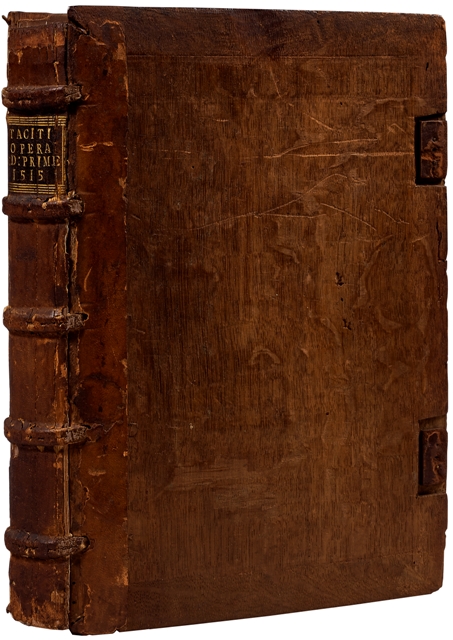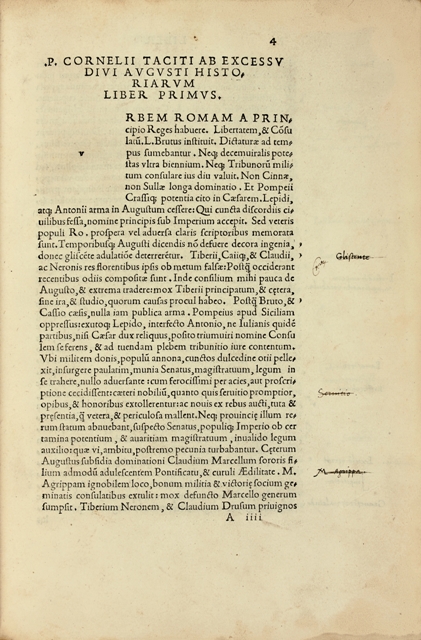Anno m.d.xv. kl. Martii. (mars 1515).
Folio [335 x 230 mm] composed of 232 ll. under the signatures A-QQ, including the frontispiece (only the ll. 4 to 73, containing the first 5 books of the Annals, are numbered) and 10 ll. Half-calf over wooden boards, spine ribbed, remains of ties, “Cornelius Tacitus” calligraphed in brown ink on the lower edge. Strictly contemporary binding.
Editio princeps of Tacitus’ Annals, “the greatest painter of Ancient history” (Jean Racine). References: Norton, Italian printers 1501-1520, p. 99: “Guillereti’s first work after the end of the partnership [J. Besicken] was his most important, the edition of Tacitus of 1 march 1515.
Precious copy printed on large paper with huge margins: 331 mm high.
“The first six books of the Annals survive in a single manuscript [it] was taken to Rome and came into the possession of Pope Leo X. Leo gave it to Filippo Beroaldo the Younger who used it to produce an impressive edition princeps in 1515” (R.J. Tarrant, in Texts and Transmission, 1983, pp. 406-07).
“This precious edition is considered as an editio princeps because it is the first one to contain the first five books of the Annals.” (Brunet, V, 633).
“First edition containing the first five books of the Annals” (Deschamps II – 719)
This first edition allowed Chateaubriand to reach the pinnacle of French literature: “When in the silence of abjection, the only sounds that can be heard are the chains of slaves and the voice of the collaborator, when everything trembles before the tyrant, when it is as dangerous to curry his favour as to merit his disgrace, the historian appears, charged with the vengeance of the peoples. Nero prospered in vain, for Tacitus was already born during the Empire” (Chateaubriand).
Besides the preliminary leaves (dedication to Pope Leo x, Beroalde to the reader “Franciscus Puteolanus lacobo Antiquario ducali Secretario…” and, at the end of the work, a letter by Pope Leo x to Beroalde), this volume contains the Historiae and/or Annals books i-v, xi-xxi, the Vita Agricolae, De situ et moribus Germaniae, an the Dialogus an sui saeculi oratores antiquioribus et quare concedant. Errata after the first 5 books. On the recto of the last leaf: errata, register and colophon and, on the verso: Pope Leo X’s arms.
The editor, Philippe Beroalde the young (F. Beroalde the elder’s nephew, 1453-1505) was born in 1472; he was Pope Leo X’s librarian [Giovanni de’ Medici], author of Latin poems, and finally professor in Bologna then in the Sapienza Univeristy of Rome. But his title of glory is to have printed the editio princeps of the first books of Tacitus’ Annals after the discovery of the manuscript in the abbey of Corvey (founded in 822, near Paderborn, by monks from Corbie in Picardy). Beroalde died in 1518. Pope Leo X had put envoys in charge of bringing him precious books and manuscripts. It was a priest from the diocese of Liege, Jean Heitmers who, unscrupulous on the means, extorted from the Corvey monastery a highly valuable manuscript since it contained the first five books of Tacitus’ Annals that could not have been found until this moment. “Pope Leo X had so little scruple regarding the provenance of this treasure, writes Pastor, that in one of his reports given to Heitmers, he simply speaks of the manuscript theft which, according to him, after being into many different hands, has finally come into his possession and, to comfort the abbey, he adds ‘We have sent a copy of the corrected and printed book with a fine binding, to the abbot and the monks, to take the place of the stolen manuscript in the library.’ ”(H. Elie, “Etienne Guillery”, Gutenberg Jahrbuch, 1932 et 1942-1947).
This 1515 editio princeps describes the long reign of Tiberius (14-37 AD.). The later is presented as a simulator, and his history is the one of a despot whose ambition, cruelty, distrusts are revealed little by little. Thanks to shady scheming, he deprives the Senate and the magistrates of any effective power; with more and more repeated accusations of lese-majesty crime, he decimates nobility: helped by secretaries without consciousness, (among whom Sejanus) dragged by Tiberius’s crazy ambition and tortuous scheming, he finally stifles the impulses towards moral superiority and any freedom. Tacit interrupts for a moment the description of these terrible miseries to compare his laborious task of historian of the Empire with the one of chroniclers, who related the glorious initiatives and the heroic fights of the Republic. There is no lack of happy expeditions though, like the ones of Germanicus against Arminius.
The qualities and flaws of the work, linked to this particular vision of history, specific to Tacit, impart the Annals a unique place in ancient historiography, and their author not only the reputation of a great artist but also the one of a deep expert of the human soul.
Value of the copy: at the Solar’s auction, the present copy has been sold 175 gold franc and n° 1060123 gold franc: François Villon. « Le Recueil des Repues franches de maistre Françoys Villon et ses compaignons. S. l. n. d. (v. 1520). La marque de G. Nyveird est à la fin. Petit in-8, gohique. mar. br. f. comp. doub. de mar. r. comp. tr. d. (Koehler). ». A. Bertin’s fine copy. (Current value: 150 000 €).
In 1878 the present volume was sold 500 gold franc (Deschamps, 719) while Madame de Pompadour’s extraordinaire copy of Rabelais 1537 was knocked nearly more than the double: “N° 625. (Rabelais) – La vie inestimable du. grant Gargantua, père de Pantagrue1, iadis cõposee par L’abstracteur de quinte essence. Liure plein de pantagruélisme M.D.XXXVII. 1537. On les vend a Lyon chés Francoys Iuste, deuant nostre Dame de confort. 16mo, goth., of 119 numbered ll.; citron mor., decorated on the covers, gilt edges. (Trautz-Bauzonnet). Very rare edition reproducing the one of 1535, the oldest known with the date of Rabelais’s first book. Very fine ruled copy, which belonged to Madame de Pompadour whose arms, which were on the previous binding, have been adapted on the inside of the new one (Current value: 350 000 €).”
A precious edition and superb volume, the only one to have appeared on the market since a few decades printed on large paper, preserved in its unrestored contemporary binding enriched with many notes finely written at the time in the very large blank margins of the copy.



